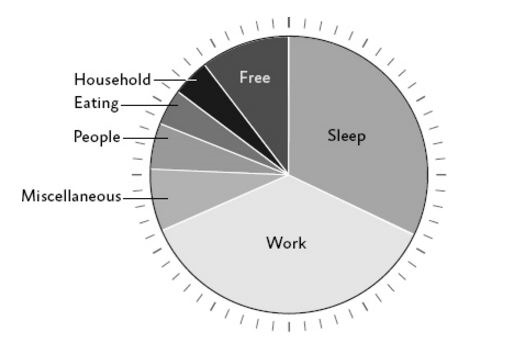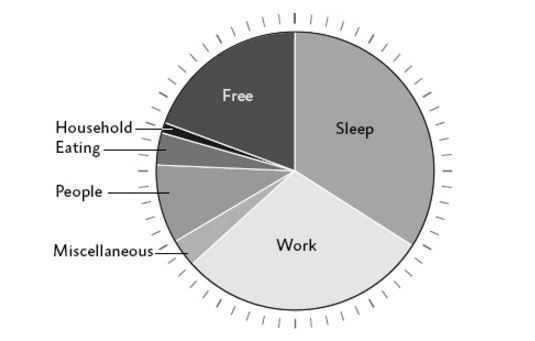Productivity as a topic has been very near and dear to my heart. Unlike most people my obsession with productivity tools, tips and techniques doesn’t revolve around the fact that my productivity allows me to squeeze a couple of hours worth of extra work into my regular workday. For me productivity is a way of life, and a way of doing more of what you want to do (or what you were meant to do) and less of what others want you to do.
Chris Bailey, as an author caught my attention because he had the courage and conviction to take an entire year off from his prime years and study productivity. The Productivity Project chronicles his learnings in that one year. The book is filled with experiments (some scientific, but most others self-applied) where the author makes himself a guinea pig and tries out some sane and some insane productivity tips and tricks.
The book begins with practical advice and claims to be able to take you from here:

To here:

Where the book started grabbing my attention was the moment Chris laid out his definition of being productive. Chris describes productivity using a simple idea of living with deliberateness and intention. He explains:
I think the best way to measure productivity is to ask yourself a very simple question at the end of every day: Did I get done what I intended to? When you accomplish what you intend to, and you’re realistic and deliberate about the productivity goals you set, in my opinion you are productive.
If at the beginning of the day you intend to write a thousand great words, and you do, you were productive.
If you intend to finish a report at work, ace a job interview, and spend quality time with your family, and you do, again, you are perfectly productive.
If you intend to relax for a day, and you have the most relaxing day you’ve had all year, you were perfectly productive.
An idea the likes of David Allen have been trying to propagate for years. The book is also full of real world practical advice ranging from simple advice like Emptying your brain, using the Pomodoro, the importance of exercise, the importance of food and the perils of Attention Hijackers like mindless surfing, but the real power of the book lies in how simplistically Chris describes some of the complex things that end up affecting your productivity. Take for instance this passage on how Sugar effects your productivity:
On a neurological level, you have mental energy when you have glucose in your brain. When you feel tired or fatigued, more often than not it’s either because your brain has too much or not enough glucose to convert into mental energy. Research has shown that the optimal amount of glucose to have in your bloodstream is around 25 grams—about the amount of glucose in a banana. This exact number isn’t all that important, but what is important is that your glucose levels can be either too high or too low.
Since unprocessed foods (in general) take longer to digest, your body converts them into glucose at a slower rate, which provides you with a steady drip of glucose (and energy) over the day—instead of a big hit of energy followed by a crash. In a way, processed foods are predigested for you by machines. This is why your body converts them into glucose so fast, and why a donut doesn’t provide you with nearly as much lasting energy as an apple.
We all know processed foods harm and effect our productivity and health, but simple explanations like these go a long way in understanding what foods to pick and provide the much needed nudge to make the right decisions. The book is also filled with surprising and mind-blowing passages which are fascinating (and somewhat philosophical) to read. Take for instance this passage on the history of time itself:
If you were around before the industrial revolution ended in the early 1800s, you wouldn’t have measured time down to the minute, not only because you didn’t have the technology to do so, but also because you didn’t need to. Before the industrial revolution, measuring time wasn’t as important, and most of us worked on the farm, where we had way fewer deadlines, meetings, and events to sequence than we have today. In fact, until the first mass-market, machine-made watches were produced in the 1850s, timepieces were unobtainable by pretty much anyone except for the super rich, and most of us charted the day’s progression by looking at the sun. Because we didn’t measure time with a clock, we would speak about events relative to other events. In the Malay language, there is even the phrase pisan zapra, which roughly translates to "about the time it takes to eat a banana."
The book of goes on to describe how in merely about 150 years, we went from not caring about time to having a huge industry and pretty much most of our lives run around set timings. The book covers productivity from more aspects than any other productivity book I’ve read thus far does. Even for an avid reader of books on topics like time management, neuroscience and psychology, a lot of the concepts the book explains (e.g. removing triggers to change your habits, exercising your focus mussel etc.) are not new at all but they are explained with a unique personal insight that I enjoyed thoroughly.
After David Allen’s GTD, if you have room for one more book on productivity, this is the book you should definitely pick up. I would give it a 5 on 5!
Comments are closed.